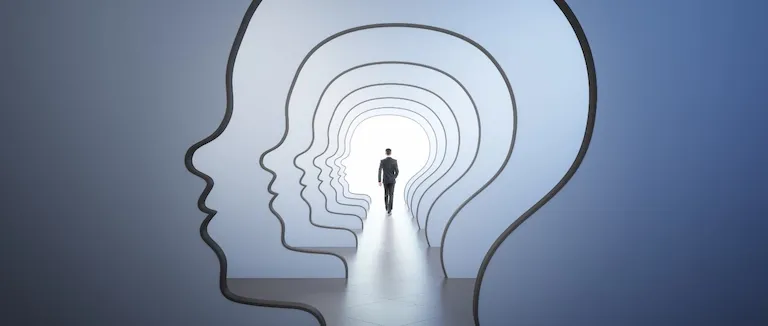-
What is schizophrenia?
-
What are the Symptoms of Schizophrenia?
-
Positive Symptoms of Schizophrenia
-
Negative Symptoms of Schizophrenia
-
Cognitive Symptoms
-
Simple Symptoms of Schizophrenia
-
What is a Schizophrenia Test?
-
Is Schizophrenia Genetic?
-
How is schizophrenia treated?
-
Frequently Asked Questions About Schizophrenia
Schizophrenia is a serious mental health disorder in which the perception and interpretation of reality is impaired. It is a chronic illness characterized by hallucinations and delusions and a difficult distinction between reality and imagination. Schizophrenia can cause severe impairment of a person's emotions, behavior and abilities. Schizophrenia is a condition that does not fully recover and requires lifelong treatment. Early treatment of schizophrenia is important to prevent the progression of the illness, control symptoms and improve the quality of life.
What is schizophrenia?
Schizophrenia is a disordered perception of reality that is accompanied by emotional and thought disorders. Schizophrenia usually begins at an early age and is more common in men than in women. This disorder is characterized by periods in which there is an ebb and flow between real life and the world of imagination, and these two states are often confused with each other. Although the causes of schizophrenia are not fully understood, it can be caused by many complex factors ranging from genetic conditions to traumatic events. Since schizophrenia can last a lifetime, it can be largely managed with a multidisciplinary treatment approach.
What are the Symptoms of Schizophrenia?
Symptoms of schizophrenia include a range of problems in thought, emotion and behavior and may vary from person to person. The condition is often characterized by hallucinations, delusions and speech disorders. In general, the symptoms of schizophrenia can be examined under 3 different headings: negative symptoms, positive symptoms and cognitive symptoms. These symptoms can be explained as follows:
Positive Symptoms of Schizophrenia
Positive symptoms of schizophrenia are an exaggeration of normal emotions and behaviors. In other words, it can also be called the display of abnormal behavior. Some of the positive symptoms are as follows:
- Hallucinations: It is a condition defined as seeing objects and people or hearing voices that do not exist in reality. People perceive the experiences they create in their minds as real and expect others to believe it.
- Delusion: A delusion is a firm attachment to a situation that is not real. Despite evidence and strong proof to the contrary, people may insist on things that do not exist. People with this condition may think that they are very famous or rich, that everyone admires them or that they have extraordinary abilities.
- Paranoia: A person is extremely insecure and suspicious. He or she may think that someone is always following him or her, watching him or her, or that he or she is being talked about on television.
Negative Symptoms of Schizophrenia
In contrast to positive symptoms, negative symptoms are a significant slowing down, stagnation and disruption of emotions and behaviors compared to normal. Negative symptoms may include
- Decreased and monotonous speech
- Decreased ability to work
- Disruption of normal daily activities
- Neglect of personal hygiene
- Experiencing social withdrawal
- Failure to make eye contact and change facial expression when talking to people
- Lack of enjoyment of life
- A general state of depression
Cognitive Symptoms
Cognitive symptoms include problems with mental functions. Some of these symptoms can be listed as follows:
- Disorganized and distorted thoughts
- Suddenly changing the subject while talking, diversion
- Using made-up words or phrases
- Forgetfulness and inability to concentrate
- Problems listening to, understanding or learning from someone
The duration and severity of schizophrenia symptoms can vary between people. For example, symptoms may progress and increase in severity if there is substance abuse, if stress levels are high or if medication prescribed by a doctor is not being used. If these symptoms are noticed, it is absolutely necessary to consult a health professional.
Simple Symptoms of Schizophrenia
Simple schizophrenia symptoms, also called early schizophrenia symptoms, usually appear in the late teens to early 20s. As these age ranges also coincide with adolescence, the symptoms can be confused with adolescent problems. In general, simple symptoms of schizophrenia can include
- Isolation from family and friends
- Changes in the environment and circle of friends
- Concentration and focus problems
- Sleep disturbance
- Problems with irritability, aggressiveness and agitation
- Having problems with authority figures at school
- Decline in academic performance
- Worry and anxiety disorders
- Vague, meaningless skepticism
Since the symptoms of simple schizophrenia are similar to those of adolescence, recognition and treatment may be delayed. For this reason, when symptoms that may belong to simple schizophrenia are noticed, it is necessary to consult a health specialist for differential diagnosis and early treatment.

What is a Schizophrenia Test?
There is no clear test to diagnose schizophrenia, but doctors can use a number of methods to identify the condition. Some of the common methods are as follows:
- Examination: In order to rule out other health problems in the diagnosis of schizophrenia, a detailed physical examination may be performed first.
- Tests: Blood, urine, MRI, CT scans may be used to detect alcohol, drug use and other evaluations.
- Psychiatric evaluation: The mental health professional may observe the patient's appearance, speech and demeanor and ask some questions. These may include questions about alcohol and drug use, suicidal thoughts or violent tendencies.
- Diagnostic criteria: The doctor may perform a final test based on the findings. He or she may assess patients according to the criteria in the Diagnostic and Statistical Manual of Mental Disorders (DSM-5) published by the American Psychiatric Association.
If you think that you or someone close to you may have schizophrenia, it is important to contact a health care provider for an accurate assessment and treatment plan.
Is Schizophrenia Genetic?
Schizophrenia is a mental health problem that is significantly affected by genetic characteristics. The likelihood of schizophrenia is higher when there is a first-degree relative such as mother, father or sibling with the condition than when there is not. A study has shown that if both parents have schizophrenia, the risk of schizophrenia in the child can be up to 50%. However, genetic predisposition is not the only reason for the development of this condition. Apart from genetic predisposition, other factors that can cause schizophrenia include
- Exposure to viruses or toxic substances.
- Having imbalances of neurotransmitters such as dopamine and glutamate.
- Substance abuse.
- Malnutrition during pregnancy.
- Taking psychoactive or psychotropic drugs at a young age.
- Having autoimmune diseases or diseases related to inflammation.
While genetic predisposition is a trigger for schizophrenia, the condition can be influenced by complex events such as environmental and physiological factors, stress and trauma.
How is schizophrenia treated?
Although there is no definitive treatment for schizophrenia, the methods used are aimed at managing the symptoms and preventing them from worsening. Some of the methods used in the treatment of schizophrenia are as follows:
- Medication: Medication is one of the most effective treatment methods for schizophrenia. In particular, antipsychotic medication can be used to control hallucinations and delusions.
- Individual therapy: Individual therapies, also known as psychosocial intervention, involve teaching people how to cope with stress and symptoms. Therapies are also important in terms of reorganizing social relationships and restoring communication skills.
- Family therapies: It is important for the positive course of treatment that family members support, understand and do not exclude their relatives diagnosed with schizophrenia. There are training therapies for family members on how they can help patients during the treatment process.
Schizophrenia treatment is individually tailored to the needs of the patient. For treatment to be effective, early diagnosis and treatment, regular check-ups and environmental support are necessary.
Frequently Asked Questions About Schizophrenia
Some of the other questions and answers about schizophrenia are as follows:
What is schizophrenia and who can be schizophrenic?
The term schizophrenic can be used for patients who have symptoms of schizophrenia and have been diagnosed by a psychiatrist. Factors that may increase the risk of schizophrenia include hereditary predispositions, imbalances in brain chemistry and stressful life events.
What is Catatonic Schizophrenia?
Catatonic schizophrenia is a subset of schizophrenia characterized by impairments in basic motor functions. People with this condition may exhibit abnormal behaviors such as prolonged immobility or excessive movement. Catatonic schizophrenia can be more clearly differentiated from other types of schizophrenia, as it leads to distinctly odd movements.
What is Paranoid Schizophrenia?
Paranoid schizophrenia is a subtype in which delusions and hallucinations are intense. People not only hallucinate, but also think that they have senses such as hearing, smelling, feeling, etc. that do not exist in reality. In paranoid schizophrenia, patients may think that they or their family are under threat or that aliens or agents are following them.
What are the Symptoms of Schizophrenia in Men?
Schizophrenia is a disorder that is more common in men as a gender. This condition, which occurs especially in the early 20s, may show more prominent features as aggression and paranoids in men.
If you think that you or someone close to you has symptoms of schizophrenia, you can consult a healthcare provider. Liv Hospital has a psychiatry department.
* Contents of this page is for informational purposes only. Please consult your doctor for diagnosis and treatment. The content of this page does not include information on medicinal health care at Liv Hospital






